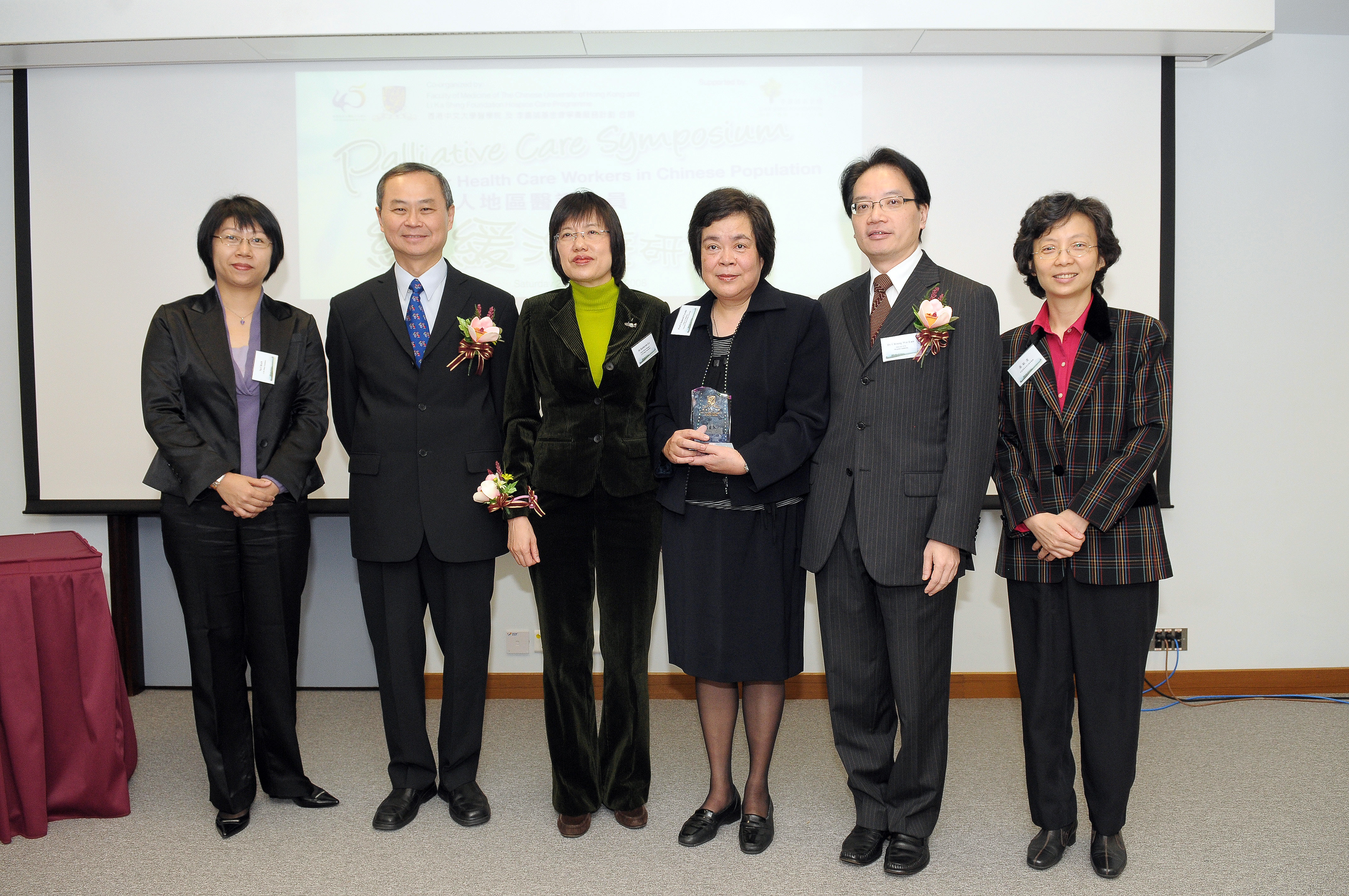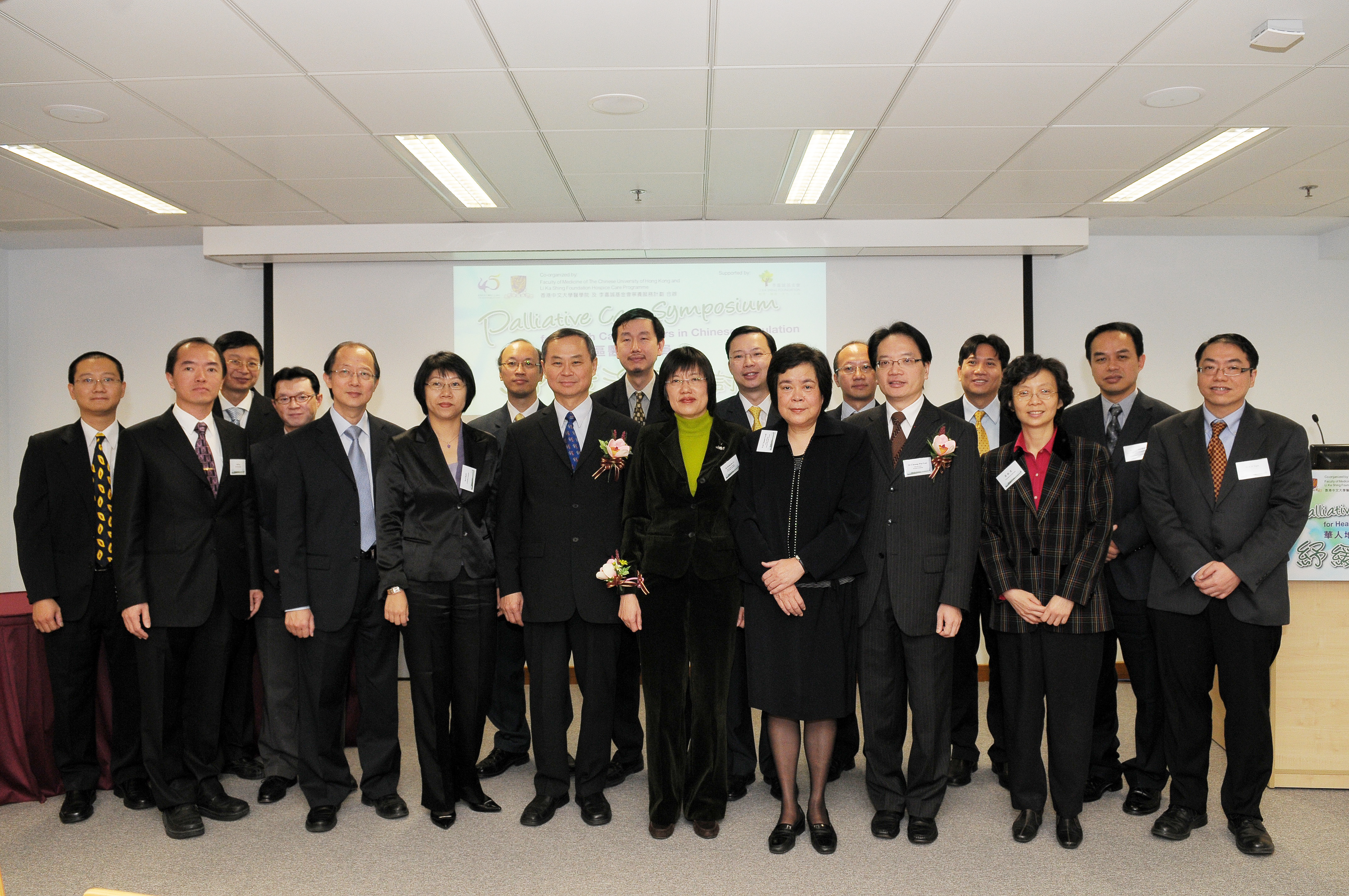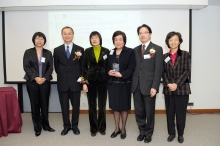CUHK
News Centre
Palliative Care Symposium for Health Care Workers in Chinese Population
Over 100 health care professionals and volunteers in palliative care from the Mainland, Taiwan and Hong Kong attended the first Palliative Care Symposium for Health Care Workers in Chinese Population jointly organized by the Faculty of Medicine of The Chinese University of Hong Kong (CUHK) and Li Ka Shing Foundation Hospice Care Programme at the CUHK Li Ka Shing Medical Sciences Building. The representatives from Li Ka Shing Foundation; Dr Cheung Wai Lun, Director (Cluster Services), Hospital Authority and Professor T F Fok, Dean, Faculty of Medicine, CUHK officiated at the Opening Ceremony. Professor Chantal Co-shi Chao, Professor, College of Medicine, National Cheng Kung University was invited to deliver a plenary lecture at the symposium. The health care professionals shared their experience and further advanced their understanding in palliative care by exchanging ways to encourage patients to lead a normal life during illness and explore the roles of the family in palliative care.
Palliative care is an approach that improves the quality of life of patients and their families through the relief of suffering by a multidisciplinary team of specially trained health care workers, with attention to relieving pain and other physical, psychosocial and spiritual problems. Palliative care is not only confined in the hospital wards, and is also supported by outreach teams. Faculty of Medicine, CUHK is dedicated to promoting and developing palliative care services. On the teaching front, in addition to lectures and tutorials on palliative medicine, all undergraduate medical students need to be attached to palliative care units and oncology wards in their final year of study. The Prince of Wales Hospital, Shatin Hospital and Bradbury Hospice are postgraduate training centres for palliative medicine. CUHK has run Certificate and Postgraduate Diploma courses in End of Life Care since 2006.
On the research front, numerous research projects are carried out by CUHK affiliated medical, nursing and paramedical staff on a wide spectrum of research topics including the management of pain, breathlessness, fatigue, depression, cancer wound, lymphedema and mucositis. Researchers had also developed new quality of life measuring tools, and produced Doctoral and Master theses. In 2007, the Li Ka Shing Foundation contributed HK$42 million to the Hospital Authority to set up hospice day care centres across eight hospital clusters, including the CUHK-affiliated Prince of Wales Hospital in Shatin, to ease the physical and emotional suffering of the terminally ill and comprehensive palliative care services. With the operation of the Li Ka Shing Foundation Hospice Care programme, new research activities such as the validation of instruments as a screening tool for psychological and overall needs of patients, are underway.
CUHK is indebted to the continued support from the Li Ka Shing Foundation. The Foundation aims at contributing to the society by helping those in need to build a better life. Its munificent support on the health care sector has benefited countless patients in Hong Kong, China and worldwide. The Foundation pioneered free hospice care services in the mainland in 1998 with the establishment of the “Heart of Gold” Nationwide Hospice Care Service Programme, which offers free hospice care for impoverished patients in 28 hospitals nationwide. Over 75,000 terminally ill patients, including those being treated in the Hong Kong hospital clusters, have benefited. To date the Foundation has donated HK$240 million to develop this palliative care programme. One of the Foundation’s focused areas is to support the palliative care services in China including Hong Kong. This symposium is made possible with the support from the Li Ka Shing Foundation. CUHK is also thankful to the Hospital Authority which aims at providing holistic care to the patients in Hong Kong. The Hospital Authority provides the patients with comprehensive palliative care services including treatment and support through multidisciplinary collaboration in its palliative care centres.
Professor T F Fok (second from left), Dean, Faculty of Medicine of The Chinese University of Hong Kong; Professor Chantal Co-shi Chao (third from right), Professor, College of Medicine, National Cheng Kung University; Dr Cheung Wai Lun, Director (Cluster Services) (second from right), Hospital Authority; and representatives from Li Ka Shing Foundation attended the opening ceremony







